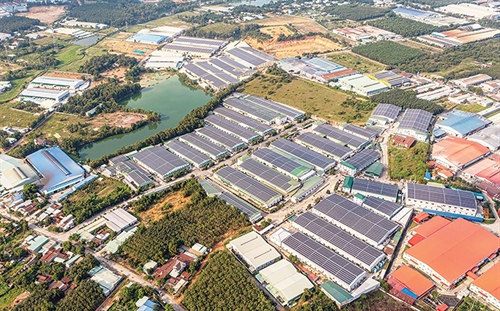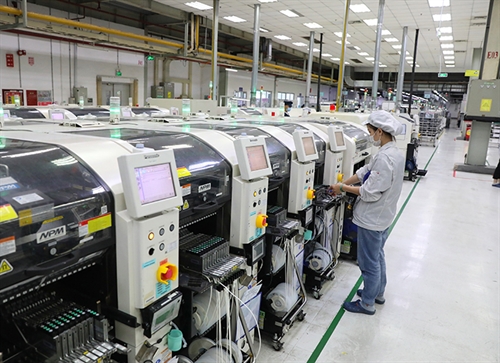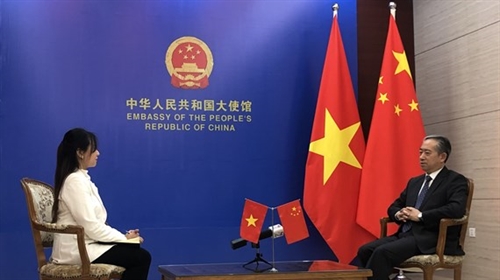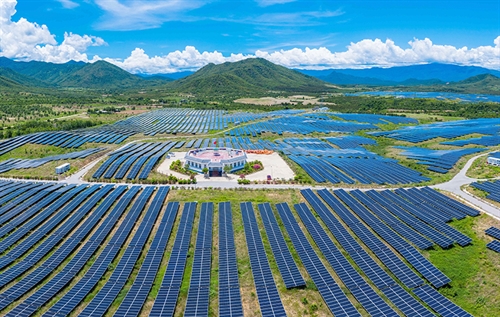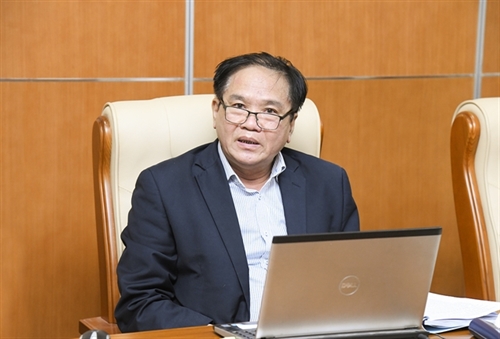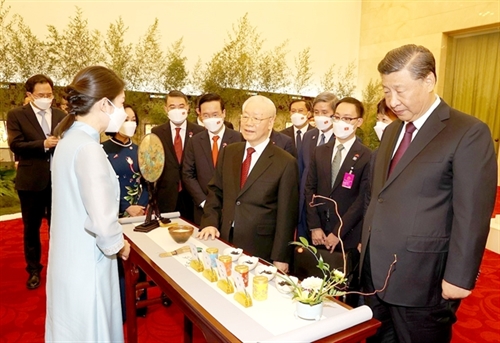Nguyen Hong Hai
Deputy Director, National Registration Agency for Secured Transactions
Ministry of Justice
On November 30, 2022, the Government issued Decree 99 in replacement of Decree 102 of 2017 on registration of security interests, adding 12 new articles and amending 61 articles based on codification of relevant circulars of the Ministry of Justice.
The changes aim to promote the effective implementation of the Civil Code and relevant laws on measures to secure the performance of civil obligations, the synchronism and consistency with new provisions of Government Decree 21/2021/ND-CP dated March 19, 2021, guiding the implementation of the Civil Code regarding security for obligation performance, particularly to secure the transparent, efficient, convenient and low-cost registration[1], and provide more legal guarantees for the counter effect of security interests, and ensure transparency, safety, discipline and standards in supervising secured debts, secured property and other related transactions in the economy.
The Decree takes effect on January 15, with its implementation guidelines to be issued by the Ministry of Justice.
The newly issued decree contains a raft of new major points below.
Scope of regulation
The new Decree covers more widely the registration, the effect of registration related to the measures secured with property, excluding lien on property, with regard to the secured property with peculiar nature such as securities shifting from non-centralized registration to centralized registration and vice versa; commodities circulated in the course of production and trading, components and materials assembled, manufactured or processed in other forms into new property; the right to use marine areas and assets attached to marine areas; annual crops, makeshift works; movables placed or installed on the ground, houses, construction works, etc.
Cases of registration and registration effect[2]
The Decree acknowledges registration including registration of changes and deregistration; adds cases of registration upon requests with regard to interests of moveable pledge, deposit, security collateral and escrow account[3], and registration of notification on realization of secured property[4]. The new regulation also specifies cases of registration under the competence of different agencies, including land registries (Article 25), Civil Aviation Authority of Vietnam (Article 38), the Vietnam Ship Registry (Article 41), the Transaction and Asset Registration Center (Article 44), the Vietnam Securities Depository and Clearing Corporation (Article 1.2), and competent offices in charge of the right to use marine areas and assets attached to marine areas (Article 10.6), while adding a mechanism to determine the competence to register property related to two or more registration offices[5].
With more comprehensive provisions addressing diverse registration cases, the Decree also provides more specifically the validity duration of registration; determines the registration effect in cases of modification of registered contents; deletion of registered contents; transfer or change of competent registration offices due to change of the secured property; cancelled registration; and overlapping registration.
Registration principles[6]
To better suit the legal nature of registration being to publicize security interests and establish their counter effect, the Decree defines more clearly responsibilities of registration applicants, registration offices, other competent agencies and other competent persons. Accordingly, the registration applicants are responsible before law for the accuracy of declared information. Meanwhile, registration offices have to strictly comply with their competence and tasks, and registration grounds, procedures and time limits; may not create any other procedures than those set out in the Decree; may not request the additional submission of any documents or any additional declarations not required by the Decree in the registration dossiers; and may not request adjusting titles and/or agreed contents of security contracts. The registration offices will not be accountable for and may not intervene in titles of contracts, contents agreed by securing parties and secured parties. They are not responsible for performing the registration to enforce the contents of court judgments or rulings or other legally valid documents of other competent bodies or persons.
Registration requesters[7]
The Decree defines more clearly and specifically registration requesters, distinguishing registration requesters from registration change requesters and deregistration requesters. It adds applicants for registrations related to sole proprietorships, registrations of notifications on realization of secured property, and expands subjects eligible to request change registration and deregistration to provide adequate legal grounds for settlement of cases arising in reality, such as lawful transferees of secured property, competent bodies and persons under law other than civil judgment enforcement bodies and executers, etc. The Decree also specifically provides the legal mechanism for performance of registration via representatives (including online registration via representatives’ accounts) or via subsidiaries of legal persons, or the registration related to property of sole proprietorships; the use of signatures of competent persons, seals (if any) of registration requesters; cases requiring signatures and seals (if any) of secured parties and securing parties and their lawful representatives.
The new regulation specifies cases requiring only the signature and seal (if any) of one entity (the secured party or the securing party, or the representative of the secured party or of the securing party), and or signatures and seals of other competent bodies or persons. In case registration dossiers are submitted online, seals and signatures can be replaced by electronic signatures and seals. Electronic signatures and seals will be as legally valid as those used on paper documents.
Particularly for foreign registration requesters, the Decree makes it clear that its provisions on registration of movables, annual crops and makeshift works under the competence of the Transaction and Asset Registration Center of the National Registration Agency for Secured Transactions under the Ministry of Justice also apply to foreigners and foreign organizations if they have the civil legal capacity or civil act capacity in accordance with Vietnam’s Civil Code[8].
Registration dossiers[9]
The Decree contains more transparent and specific provisions on determination of valid dossiers, valid registration applications and registration dossiers according to different types of property under the competence of each registration office[10]. Notably, the Decree adds a mechanism to determine registration dossiers in case they are submitted online, affirming that online registration dossiers have the same legal validity as paper registration dossiers.
Regarding the registration involving foreign elements, the Decree provides that forms, documents and declarations in registration and information provision must be in Vietnamese. Foreign-language documents may be accepted only it is provided by law that registration formalities can be made in both Vietnamese and foreign language; or accepted for family names and given names of foreigners; names of organizations bearing foreign nationality or established under foreign laws; and proper names of secured property being not in Vietnamese but conforming with relevant regulations or legally valid decisions of competent authorities. Papers and documents involving foreign elements used in registration and information provision are not required to be consularly legalized.
As for methods of submitting registration dossiers, the Decree addresses the submission of registration dossiers online, by hand-delivery, by post, or via email[11]. Meanwhile, it adds a mechanism for application of regulations on land, exploitation and use of marine resources, aviation or maritime navigation to the submission of registration dossiers through online systems or via email.
Regarding ways of notification of registration results, the Decree improves the mechanism for notification of registration results by registration offices in order to ensure synchronism with the dossier-submitting modes as well as with peculiarities in the process of carrying out administrative procedures by these agencies. It adds provisions on return of originals of certificates being components of registration dossiers. When copies of registration certificates are requested, modes of submission, duration of dossier processing and notification of processing results will be the same as those applicable to registration applications; and electronic copies of written certificates have the same legal validity as documental copies.
Online registration[12]
The Decree again affirms this registration mode by:
(i) Defining more specifically the mechanism for grant of online registration accounts, types of online registration accounts, including regular-use accounts and single-use accounts; specifying agencies competent to issue online registration accounts for case of registering security interests with movables, annual crops or makeshift works; adding a mechanism for application of the land law, exploitation and use of marine resources, aviation or maritime navigation in determining the agencies competent to grant online registration accounts and in carrying out online registration procedures.
(ii) Further specifying online registration procedures under which registration applicants are required, after logging in the online registration system and declaring information, to authenticate their registration dossiers, attaching electronic files if so required by law, and pay charges;
(iii) Adding the mechanism for determining the dossier-processing duration and the mechanism for rejecting online registration; and,
(iv) Putting in place mechanisms for online registration via representatives and application according to online registration procedures. In this case, representatives have to declare accounts of represented persons. Information on registered security interests must be updated on the represented persons’ accounts, not on accounts of their representatives.
Rejection of registration[13]
The Decree provides more specifically and transparently grounds for rejecting registration, including invalidity of registration dossiers or inconsistency of information declared in registration dossiers with information stored at the registration offices or inconsistency of information in registration applications with information in certificates.
Meanwhile, the Decree says that the registration offices will be held responsible for groundless rejection of registration applications. They must point to contents to be completed or supplemented when rejecting the registration, if rejection grounds can be redressed by registration applicants. As stated in the Decree, when competent bodies or persons request the registration offices to suspend, stop or refuse to carry out the registration, registration offices may reject the registration only when receiving written requests before recording and updating registration contents in registration books or databases; if receiving such requests after the registration has been made, the registration offices must notify such to the requesters.
Registration of changes[14]
The Decree clearly enumerates grounds for registration of changes, including:
(i) Change of the securing party and the secured party and exceptions of this case; registration for secured property already agreed in security contracts in case the previously registered contents do not cover this property; the secured property is the future property already formed in case such property is eligible for grant of ownership certificates in accordance with law; other cases at the request of registration applicants in order to change information already declared in written registration applications;
(ii) Supplementation to further clarify the legal mechanism for the registration of change of the securing parties or the secured parties[15].
(iii) Creation of a new mechanism for handling cases of supplementation to registration of secured property, addition of secured property, and addition of secured obligations. By this mechanism, registration applicants may register changes in existing security interests or register new security interests. Another ground is supplementation of a mechanism to secure the rights and benefits of registration applicants, under which the registration offices and other competent bodies or organizations may not request the registration of changes or request deregistration with regard to the registered contents not falling within the scope of registration of changes or within the right to reclaim debts or transferred obligations;
(iv) Creation of a new mechanisms for handling cases of change of information relating to registered security interests, such as information on secured property being land plots, houses, other assets attached to land, means of transport, other assets subject to registration of ownership, use right, circulation right or other lawfully established rights, with alterations as compared to certificates;
(v) Creation of a new mechanism for handling cases in which the secured property is recovered, dismantled, destroyed or confiscated and is substituted, swapped or created by land use rights, houses, construction works or other land-attached assets; and,
(vi) Creation of a new mechanism for handling cases in which registration applicants submit a dossier for registration of changes in land and land-attached assets together with a dossier for registration of changes.
Correction of erroneous information in registered contents[16]
The Decree deals with this matter by determining that correction of erroneous information due to faults of registration offices is not an administrative procedure[17]. In this case, registration offices have to promptly correct erroneous information upon detection of errors while notifying in writing such to the registration applicants concerned. As for cases of correcting erroneous information due to faults of registration applicants, this should comply with the procedures for registration of changes.
Deregistration[18]
The Decree specifies more cases of deregistration and deregistration dossiers corresponding to cases of deregistration in which:
(i) The secured obligations terminate; contents of cancelled security contracts include the registered security interests; legally effective court judgments or rulings order the deregistration by registration offices; secured property is no longer used as capital contribution, substituted, assigned, transferred, consolidated, merged, mixed, or processed in the form of assembly, manufacture or other forms, or is recovered; assets attached to rented land with annual payment of rentals, which are secured assets but the State recovers the land without compensation for land-attached assets; secured assets being airplanes no longer registered with Vietnamese nationality, annually harvested crops or dismantled makeshift works, etc.
(ii) The Decree provides the deregistration process when registration offices receive court judgments or rulings involving a deregistration order; transaction and asset registration centers receive papers on transfer of mortgage registration from land registration offices.
(iii) The Decree adds a provision on recognition by registration offices of the deregistration of property withdrawn in case of change registration for withdrawal of secured property.
Cancellation of registration[19]
In order to more clearly distinguish legal consequences of the termination of registration validity, the Decree provides:
(i) Legal concept and mechanisms for registration cancellation; the distinction between registration cancellation and deregistration, between invalid registration and termination of registration validity, specifying cases of registration cancellation[20];
(ii) That registration cancellation is not an administrative procedure, creating a mechanism for registration cancellation and restoration of cancelled registration by competent registration offices;
(iii) The application of consequences of registration cancellation to subsequently established registration in case of overlapping registration for movables, annual crops and makeshift works.
Provision of information[21]
The Decree states that information on registered security interests should be provided upon requests or in accordance with law. Information provision requesters are entitled to use registration results and information provision results to perform their lawful rights and obligations at competent agencies or organizations, and to establish and perform civil transactions.
On that basis, the Decree further specifies the mechanism for provision of information on security interests among registration offices and between registration offices and competent agencies and competent persons in accordance with law.
Regarding the provision of information on security interests upon requests of individuals and organizations (including foreign entities), the Decree provides two legal mechanisms:
(i) For information on security interests with ships, movables, annual crops or makeshift works, applications for information provision should be sent directly or via the network to competent registration offices. For information on security interests involving land use rights, land-attached assets, the right to use marine areas and assets attached to marine areas or airplanes, requests for information provision must be made in accordance with the law on land, marine resource exploitation and use, or aviation;
(ii) Searching information on databases with user codes. In this case, organizations and individuals may request competent agencies defined in Article 23.3 of the Decree to grant user codes online or send written requests to these agencies[22]. The code requesters are obliged to pay a charge in accordance with the law on charges and fees.-
Deputy Director, National Registration Agency for Secured Transactions
Ministry of Justice
On November 30, 2022, the Government issued Decree 99 in replacement of Decree 102 of 2017 on registration of security interests, adding 12 new articles and amending 61 articles based on codification of relevant circulars of the Ministry of Justice.
The changes aim to promote the effective implementation of the Civil Code and relevant laws on measures to secure the performance of civil obligations, the synchronism and consistency with new provisions of Government Decree 21/2021/ND-CP dated March 19, 2021, guiding the implementation of the Civil Code regarding security for obligation performance, particularly to secure the transparent, efficient, convenient and low-cost registration[1], and provide more legal guarantees for the counter effect of security interests, and ensure transparency, safety, discipline and standards in supervising secured debts, secured property and other related transactions in the economy.
The Decree takes effect on January 15, with its implementation guidelines to be issued by the Ministry of Justice.
The newly issued decree contains a raft of new major points below.
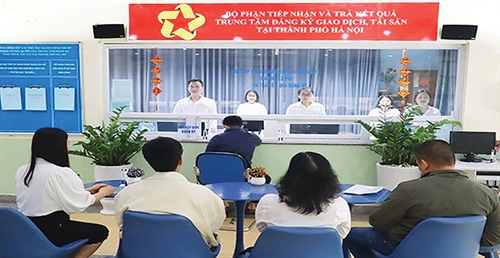 |
People wait to carry out procedures for registration of secured transactions at the Hanoi Transaction and Asset Registration Center Photo: https://dktructuyen.moj.gov.vn/ |
The new Decree covers more widely the registration, the effect of registration related to the measures secured with property, excluding lien on property, with regard to the secured property with peculiar nature such as securities shifting from non-centralized registration to centralized registration and vice versa; commodities circulated in the course of production and trading, components and materials assembled, manufactured or processed in other forms into new property; the right to use marine areas and assets attached to marine areas; annual crops, makeshift works; movables placed or installed on the ground, houses, construction works, etc.
Cases of registration and registration effect[2]
The Decree acknowledges registration including registration of changes and deregistration; adds cases of registration upon requests with regard to interests of moveable pledge, deposit, security collateral and escrow account[3], and registration of notification on realization of secured property[4]. The new regulation also specifies cases of registration under the competence of different agencies, including land registries (Article 25), Civil Aviation Authority of Vietnam (Article 38), the Vietnam Ship Registry (Article 41), the Transaction and Asset Registration Center (Article 44), the Vietnam Securities Depository and Clearing Corporation (Article 1.2), and competent offices in charge of the right to use marine areas and assets attached to marine areas (Article 10.6), while adding a mechanism to determine the competence to register property related to two or more registration offices[5].
With more comprehensive provisions addressing diverse registration cases, the Decree also provides more specifically the validity duration of registration; determines the registration effect in cases of modification of registered contents; deletion of registered contents; transfer or change of competent registration offices due to change of the secured property; cancelled registration; and overlapping registration.
Registration principles[6]
To better suit the legal nature of registration being to publicize security interests and establish their counter effect, the Decree defines more clearly responsibilities of registration applicants, registration offices, other competent agencies and other competent persons. Accordingly, the registration applicants are responsible before law for the accuracy of declared information. Meanwhile, registration offices have to strictly comply with their competence and tasks, and registration grounds, procedures and time limits; may not create any other procedures than those set out in the Decree; may not request the additional submission of any documents or any additional declarations not required by the Decree in the registration dossiers; and may not request adjusting titles and/or agreed contents of security contracts. The registration offices will not be accountable for and may not intervene in titles of contracts, contents agreed by securing parties and secured parties. They are not responsible for performing the registration to enforce the contents of court judgments or rulings or other legally valid documents of other competent bodies or persons.
Registration requesters[7]
The Decree defines more clearly and specifically registration requesters, distinguishing registration requesters from registration change requesters and deregistration requesters. It adds applicants for registrations related to sole proprietorships, registrations of notifications on realization of secured property, and expands subjects eligible to request change registration and deregistration to provide adequate legal grounds for settlement of cases arising in reality, such as lawful transferees of secured property, competent bodies and persons under law other than civil judgment enforcement bodies and executers, etc. The Decree also specifically provides the legal mechanism for performance of registration via representatives (including online registration via representatives’ accounts) or via subsidiaries of legal persons, or the registration related to property of sole proprietorships; the use of signatures of competent persons, seals (if any) of registration requesters; cases requiring signatures and seals (if any) of secured parties and securing parties and their lawful representatives.
The new regulation specifies cases requiring only the signature and seal (if any) of one entity (the secured party or the securing party, or the representative of the secured party or of the securing party), and or signatures and seals of other competent bodies or persons. In case registration dossiers are submitted online, seals and signatures can be replaced by electronic signatures and seals. Electronic signatures and seals will be as legally valid as those used on paper documents.
Particularly for foreign registration requesters, the Decree makes it clear that its provisions on registration of movables, annual crops and makeshift works under the competence of the Transaction and Asset Registration Center of the National Registration Agency for Secured Transactions under the Ministry of Justice also apply to foreigners and foreign organizations if they have the civil legal capacity or civil act capacity in accordance with Vietnam’s Civil Code[8].
Registration dossiers[9]
The Decree contains more transparent and specific provisions on determination of valid dossiers, valid registration applications and registration dossiers according to different types of property under the competence of each registration office[10]. Notably, the Decree adds a mechanism to determine registration dossiers in case they are submitted online, affirming that online registration dossiers have the same legal validity as paper registration dossiers.
Regarding the registration involving foreign elements, the Decree provides that forms, documents and declarations in registration and information provision must be in Vietnamese. Foreign-language documents may be accepted only it is provided by law that registration formalities can be made in both Vietnamese and foreign language; or accepted for family names and given names of foreigners; names of organizations bearing foreign nationality or established under foreign laws; and proper names of secured property being not in Vietnamese but conforming with relevant regulations or legally valid decisions of competent authorities. Papers and documents involving foreign elements used in registration and information provision are not required to be consularly legalized.
As for methods of submitting registration dossiers, the Decree addresses the submission of registration dossiers online, by hand-delivery, by post, or via email[11]. Meanwhile, it adds a mechanism for application of regulations on land, exploitation and use of marine resources, aviation or maritime navigation to the submission of registration dossiers through online systems or via email.
Regarding ways of notification of registration results, the Decree improves the mechanism for notification of registration results by registration offices in order to ensure synchronism with the dossier-submitting modes as well as with peculiarities in the process of carrying out administrative procedures by these agencies. It adds provisions on return of originals of certificates being components of registration dossiers. When copies of registration certificates are requested, modes of submission, duration of dossier processing and notification of processing results will be the same as those applicable to registration applications; and electronic copies of written certificates have the same legal validity as documental copies.
Online registration[12]
The Decree again affirms this registration mode by:
(i) Defining more specifically the mechanism for grant of online registration accounts, types of online registration accounts, including regular-use accounts and single-use accounts; specifying agencies competent to issue online registration accounts for case of registering security interests with movables, annual crops or makeshift works; adding a mechanism for application of the land law, exploitation and use of marine resources, aviation or maritime navigation in determining the agencies competent to grant online registration accounts and in carrying out online registration procedures.
(ii) Further specifying online registration procedures under which registration applicants are required, after logging in the online registration system and declaring information, to authenticate their registration dossiers, attaching electronic files if so required by law, and pay charges;
(iii) Adding the mechanism for determining the dossier-processing duration and the mechanism for rejecting online registration; and,
(iv) Putting in place mechanisms for online registration via representatives and application according to online registration procedures. In this case, representatives have to declare accounts of represented persons. Information on registered security interests must be updated on the represented persons’ accounts, not on accounts of their representatives.
Rejection of registration[13]
The Decree provides more specifically and transparently grounds for rejecting registration, including invalidity of registration dossiers or inconsistency of information declared in registration dossiers with information stored at the registration offices or inconsistency of information in registration applications with information in certificates.
Meanwhile, the Decree says that the registration offices will be held responsible for groundless rejection of registration applications. They must point to contents to be completed or supplemented when rejecting the registration, if rejection grounds can be redressed by registration applicants. As stated in the Decree, when competent bodies or persons request the registration offices to suspend, stop or refuse to carry out the registration, registration offices may reject the registration only when receiving written requests before recording and updating registration contents in registration books or databases; if receiving such requests after the registration has been made, the registration offices must notify such to the requesters.
Registration of changes[14]
The Decree clearly enumerates grounds for registration of changes, including:
(i) Change of the securing party and the secured party and exceptions of this case; registration for secured property already agreed in security contracts in case the previously registered contents do not cover this property; the secured property is the future property already formed in case such property is eligible for grant of ownership certificates in accordance with law; other cases at the request of registration applicants in order to change information already declared in written registration applications;
(ii) Supplementation to further clarify the legal mechanism for the registration of change of the securing parties or the secured parties[15].
(iii) Creation of a new mechanism for handling cases of supplementation to registration of secured property, addition of secured property, and addition of secured obligations. By this mechanism, registration applicants may register changes in existing security interests or register new security interests. Another ground is supplementation of a mechanism to secure the rights and benefits of registration applicants, under which the registration offices and other competent bodies or organizations may not request the registration of changes or request deregistration with regard to the registered contents not falling within the scope of registration of changes or within the right to reclaim debts or transferred obligations;
(iv) Creation of a new mechanisms for handling cases of change of information relating to registered security interests, such as information on secured property being land plots, houses, other assets attached to land, means of transport, other assets subject to registration of ownership, use right, circulation right or other lawfully established rights, with alterations as compared to certificates;
(v) Creation of a new mechanism for handling cases in which the secured property is recovered, dismantled, destroyed or confiscated and is substituted, swapped or created by land use rights, houses, construction works or other land-attached assets; and,
(vi) Creation of a new mechanism for handling cases in which registration applicants submit a dossier for registration of changes in land and land-attached assets together with a dossier for registration of changes.
Correction of erroneous information in registered contents[16]
The Decree deals with this matter by determining that correction of erroneous information due to faults of registration offices is not an administrative procedure[17]. In this case, registration offices have to promptly correct erroneous information upon detection of errors while notifying in writing such to the registration applicants concerned. As for cases of correcting erroneous information due to faults of registration applicants, this should comply with the procedures for registration of changes.
Deregistration[18]
The Decree specifies more cases of deregistration and deregistration dossiers corresponding to cases of deregistration in which:
(i) The secured obligations terminate; contents of cancelled security contracts include the registered security interests; legally effective court judgments or rulings order the deregistration by registration offices; secured property is no longer used as capital contribution, substituted, assigned, transferred, consolidated, merged, mixed, or processed in the form of assembly, manufacture or other forms, or is recovered; assets attached to rented land with annual payment of rentals, which are secured assets but the State recovers the land without compensation for land-attached assets; secured assets being airplanes no longer registered with Vietnamese nationality, annually harvested crops or dismantled makeshift works, etc.
(ii) The Decree provides the deregistration process when registration offices receive court judgments or rulings involving a deregistration order; transaction and asset registration centers receive papers on transfer of mortgage registration from land registration offices.
(iii) The Decree adds a provision on recognition by registration offices of the deregistration of property withdrawn in case of change registration for withdrawal of secured property.
Cancellation of registration[19]
In order to more clearly distinguish legal consequences of the termination of registration validity, the Decree provides:
(i) Legal concept and mechanisms for registration cancellation; the distinction between registration cancellation and deregistration, between invalid registration and termination of registration validity, specifying cases of registration cancellation[20];
(ii) That registration cancellation is not an administrative procedure, creating a mechanism for registration cancellation and restoration of cancelled registration by competent registration offices;
(iii) The application of consequences of registration cancellation to subsequently established registration in case of overlapping registration for movables, annual crops and makeshift works.
Provision of information[21]
The Decree states that information on registered security interests should be provided upon requests or in accordance with law. Information provision requesters are entitled to use registration results and information provision results to perform their lawful rights and obligations at competent agencies or organizations, and to establish and perform civil transactions.
On that basis, the Decree further specifies the mechanism for provision of information on security interests among registration offices and between registration offices and competent agencies and competent persons in accordance with law.
Regarding the provision of information on security interests upon requests of individuals and organizations (including foreign entities), the Decree provides two legal mechanisms:
(i) For information on security interests with ships, movables, annual crops or makeshift works, applications for information provision should be sent directly or via the network to competent registration offices. For information on security interests involving land use rights, land-attached assets, the right to use marine areas and assets attached to marine areas or airplanes, requests for information provision must be made in accordance with the law on land, marine resource exploitation and use, or aviation;
(ii) Searching information on databases with user codes. In this case, organizations and individuals may request competent agencies defined in Article 23.3 of the Decree to grant user codes online or send written requests to these agencies[22]. The code requesters are obliged to pay a charge in accordance with the law on charges and fees.-
[1] The objectives, contents and solutions of administrative reform and building of e-Government have been defined and identified in a consistent and strategic manner by the Government and Prime Minister with many synchronous and unified political and legal bases, such as Resolution 02/NQ-CP of January 1, 2022; Resolution 68/NQ-CP of May 12, 2020; Resolution 76/NQ-CP of July 15, 2021; Resolution 131/NQ-CP of October 6, 2021; the Scheme on renewed implementation of inter-agency one-stop mechanism in handling of administrative procedures in the 2021-25 period; the Scheme on development of the application of population databases, and electronic identification and authentication in service of national digital transformation in the 2022-25 period, with a vision toward 2030; and Prime Minister Decision 1085/QD-TTg of September 15, 2022.
[2] Articles 4, 6, 10, 25, 38, 41 and 44 of Decree 99/2022/ND-CP.
[3] In this case, the counter effect of security interests is not counted from the time the securing party holds the secured property but from the time the security interests are registered (Article 298.2 of the Civil Code, Article 23.2 of Decree 21/2021/ND-CP, and Article 6.1 of Decree 99/2022/ND-CP).
[4] Registration of notification on realization of the secured property only has the effect of publicizing the information on realization of secured property but does not give rise to the counter effect.
[5] For example, the secured property is securities and property rights arising from securities; annual crops, makeshift works; movables installed or placed at construction works or on the ground; commodities, materials, components, and equipment assembled, manufactured or processed in other forms into new property.
[6] Articles 6 and 19 of Decree 99/2022/ND-CP.
[7] Articles 8, 9, 12, 24.2 of Decree 99/2022/ND-CP.
[8] Article 44.4 of Decree 99/2022/ND-CP.
[9] Articles 3.5, 3.6, 7, 13, 16, 17, 22 and 24.1 of Decree 99/2022/ND-CP.
[10] For example, regarding the registration of the rights to use land and assets attached to land, the Decree supplements or amends the provisions on registration dossiers in case project owners mortgage the projects including the land use rights, for cases in which the project owners only mortgage assets affixed to land of the project; dossiers of registration of mortgage of investment projects for construction of works other than houses, agricultural investment projects, forest development projects, other land-using investment projects, for dossiers of registration of mortgage of construction works, other land-attached assets other than future houses of the investment projects, etc.
[11] Articles 13 and 24.1 of Decree 99/2022/ND-CP.
[12] Articles 23 and 24 of Decree 99/2022/ND-CP.
[13] Articles 15, 36 and 37 of Decree 99/2022/ND-CP.
[14] Articles 18. 36, 37 and relevant articles and clauses in Decree 99/2022/ND-CP.
[15] For example: In case of change due to transfer of debt reclaim rights, transfer of obligations, the notarization and certification of transfer documents shall be agreed upon by parties; if the debt claim rights or obligations are partially transferred, the registration of change will apply to transferred parts of the debt claim rights or obligations.
[16] Article 19 of Decree 99/2022/ND-CP.
[17] Decree 102/2017/ND-CP deals with this matter that the correction of errors made by registration offices is an administrative procedure, with provisions on dossiers (Articles 27, 35, 44 and 50) and implementation procedures (Articles 30, 38, 48 and 52) at each system of registration offices.
[18] Articles 20 and related articles and clauses of Decree 99/2022/ND-CP.
[19] Articles 3.8, 6.4, 21 and 49 of Decree 99/2022/ND-CP.
[20] With legally effective court judgments or rulings that rule to cancel the registration; security interests already registered in which the registration offices detect that the registration was made ultra vires, or documents, signatures or seals in registration dossiers are fake.
[21] Articles 5.6, 9. 23.3, 51, 52 and 53 of Decree 99/2022/ND-CP.
[22] The National Registration Agency for Secured Transactions of the Ministry of Justice is competent to grant accounts for registration cases defined in Article 44 of the Decree. Agencies competent to grant accounts for registration cases defined in Articles 25, 38 and 41 of the Decree or cases of registration of security interests with the right to use sea areas and assets attached to seas areas must comply with the laws on land, aviation, maritime or marine resource exploitation and use.
